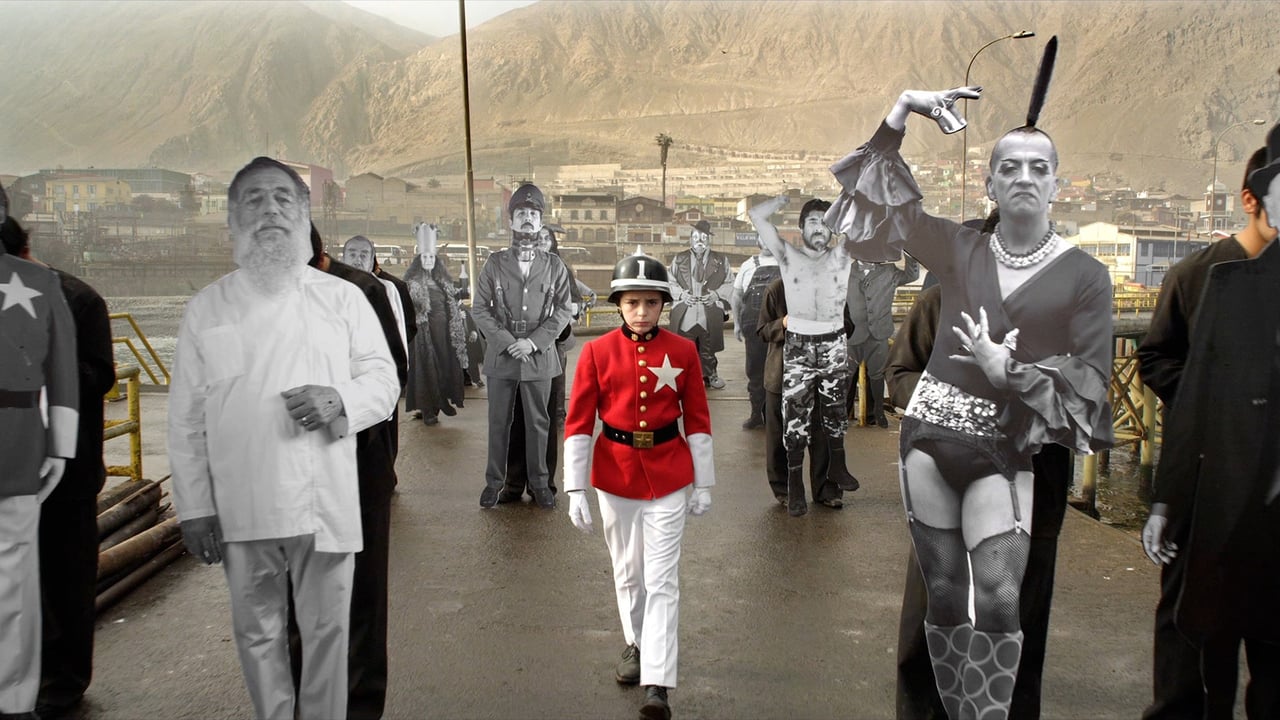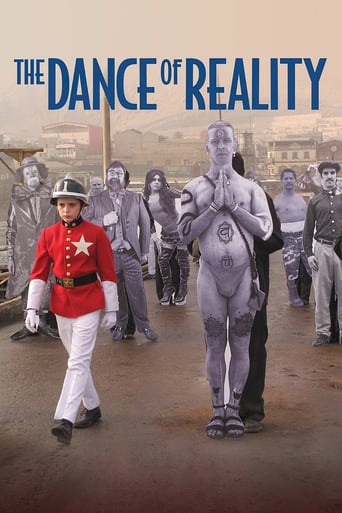



Very well executed
Disturbing yet enthralling
A story that's too fascinating to pass by...
This is one of the best movies I’ve seen in a very long time. You have to go and see this on the big screen.
View MoreIn his first film in 23 years 86-year-old Alejandro Jodorowsky produces a spectacular surrealist meditation on the nature of humanity. His examination of character operates on two levels. As his father transforms from macho autocrat to sensitivity and vulnerability, Jodorowsky's subject is how to be a proper human. But as that story is played against the background of Chilean politics the same lesson applies to the body politic: how can a government be properly humane. Here Jodorowsky's father looks like the dictator Ortiz — tall, thin, strutting, strong cheekbones, affecting the same moustache — against whom he plots, first a revolt then assassination. At the crucial moment he can't shoot him because his hands are suddenly crippled, a metaphor for the fact he unawares admires and emulates the autocracy his politics opposes. His hands lock because he can't kill the outer embodiment of his self; he has to kill it within. His wife frees him by making him fire at the images of Stalin, Ortiz and himself, that is, purging himself of his autocratic insensitive past self.The father's crippling connects him to the community of mine-damaged cripples whom he earlier disparaged, refused to let his son help and even attacked. His — first psychological, then physical — crippling is imaged in their missing limbs. All are reduced by their ruinous, uncaring society. The society that pragmatically rejects the broken, the disadvantaged, reflects in the father's rejection of his son's sensitivity — that dread homosexuality — and his cruel tests to toughen him. In contrast to the father's skeletal sternness, the mother has an operatic extravagance both in emotion — she sings all her lines as arias — and in her mothering bosom. She strips down exuberantly to cure her son's fear of the darkness with a frolic. His mother heals his father by urinating on him, a brazen parody of baptism and washing away his sins. Earlier the father blew out the radio by urinating on it during Ortiz's public address. The wife's beneficent wash corrects the destructive macho posturing of his. There are other parodies of Christianity in the film. The mother thinks her son is the reincarnation of her father and rejects him when he loses his long blond hair. The father passes through a series of tests and tortures on the road to redemption, resisting the temptation to betray his ideals. At the end the hawking dwarf outside the family's clothing store turns water into wine — reducing Christ's miracle to a parlour trick. When most in need the father is rejected by the film's one priest, a callous unchristian sort. The ranting theosophist may seem a salutary alternative to the various churches of greed and power — until he shows his own cruelty in forcing the young hero to fight his dead friend's twin brother in a bar. No religion is valid if it countenances human cruelty. That's why Jodorowsky's "reality" is not fixed, hard and cold, but a "dance," inviting openness, spontaneity, partnering and joy.Jodorowsky pere is Jewish — and constantly insulted as such — but shows no sign of faith or observance. His conversion from cruel tyrant to sensitivity and forgiveness evokes the change from the Old Testament God to the New. That applies equally to the concept of what kind of person and what kind of government one should be. Obviously this is a very personal film. Jodorowsky himself plays his adult self and his son Brontis plays Alejandro's father. Its true signature is the brilliant invention in imagery, music and event.
View Morethe night before going to see this film, I had been rewatching "Pan's Labyrinth" and therefore could not help comparing between the two male leads. I am referring to the evil officer character in "Pan," compared to Jaime in this film. Both are very much representations of a paternally structured society, where men are not allowed to show weakness, and everything is about "who is boss" and one's actions are determined by the fear of punishment and the fear of losing power. in "Pan" the evil officer punishes everything that is intuitive or seemingly irrational or superstitious, creating an icy paranoid environment where the little girl has to escape into her imagination. likewise in this film, Jaime punishes anything in his son that is feminine and therefore considered by him to be "weak." notably the first 20minutes were told from the son's point of view, which accentuates Jamie's harsh parenting. then gradually it makes a full switch to Jamie's point of view. an interesting choice, though it did throw me off. I suppose in the Theosophist's view "everything is one" so it would make no difference whether it's the father's story or the son's story, it is all one story which is the human story, something like that.in "Pan" the officer was pure evil right to the end, but Jodorowsky naturally takes a more complex view. as the years pass more is revealed about Jamie who turns out to be more than a two-dimensional brute. he joins underground political movements, puts his life on the line to help the sick, and becomes an undercover assassin. after experiencing a crisis of conscience, he goes through a brief religious phase before returning to his family. the problem is that all of this time, his brain is still running the same operating system of a fear- based, authoritarian hierarchical mindset. even the seemingly noble deeds are motivated by fear not love, that is fear of losing face or being seen as a coward.to an extent it is true that "fear is a motivator." Jodorowski makes this point repeatedly through his portrayals of anti-semitism. the Jewish fear of being ostracized drives them to achieve more and prove their worth to society. however this fear-based way of thinking ultimately leads Jamie to an unthinkable place, betraying his comrade in pursuit of vain glory and killing a man in cold blood. this ties into another difficulty with the film, it is supposedly a comedy but the main character is entirely unlikable, he is introduced as a monstrous father and subsequently it is hard to care what happens to him. but if one can let go of issues like this, the film turns out to be fairly rewarding.in the end Jamie cures his own paralysis by symbolically destroying the images of his political idols. by recognizing his own potential for evil, he gains a new perspective.Jodorowsky seems to be saying that it doesn't matter which political party you join, or whether you happen to be on the winning side or if you're the guy with the big gun or the little guy begging for crumbs. we are all part of a very sick society that has become outwardly sophisticated but nevertheless governed by the same brain circuits as the great apes. really it is not that one person is more evil than the other, as we are all ruled by the same animal circuits if we happened to be in Stalin's situation we are likely to do the same thing. that may be an extreme way of putting it, but I believe he has a point.
View MoreAlejandro Jodorowsky returns after more than 20 years. Much like his film Santa Sangre, which was made after a long absence, he goes all out on this one. As you might expect, it's totally insane. It's not very subtle, but you can forgive the director since he comes up with so many memorable, crazy bits. This is very autobiographical, detailing Jodorowsky's childhood in Tocopillo, Chile in the 1930s. Most of the focus is on Alejandro's father, played by his son Brontis. Jaime Jodorowsky was an overbearing communist who lorded over his effeminate son (Jeremias Herskovits) and his opera-singing wife (Pamela Flores). When Jaime gets a chance, he goes off to assassinate the military dictator Ibanez (Bastian Bodenhofer), but he fails and is separated from his family for years (apparently). Some of this film is a bit overbearing, especially in its overly sexualized scenes. I could really have done without Flores' constant nudity (as well as her urine). I could also have done without the CGI seagulls, which are far too reminiscent of the crapsterpiece Birdemic: Shock and Terror. I was a little afraid for a while that Jodorowsky, whose fantastical mind can imagine any number of bizarre images, would utilize this crappy looking CGI often throughout the film, but thankfully it more or less disappears after the opening bits. While the film is uneven and overlong, there are plenty of wonderful sequences, especially in the second half. The final scene in particular is just fantastic. I wouldn't quite put this up with Jodorowsky's best (which in my opinion are Santa Sangre and The Holy Mountain), but it's worthwhile. I'm very happy he got to have one more go-around. Here's to yet another.
View MoreAlejandro Jodorowsky is back! Could there be a better time? Cinema needs daring filmmakers like this who ground the truly absurd in reality. Like EL TOPO and HOLY MOUNTAIN, THE DANCE OF REALITY is far from perfect. The film is at least 30 minutes too long with sequences that come out of left field with no impact. But the central statement, an examination of dogma-- religious, social, and political--the easy bending of our minds that impact us all, is an important topic to explore and Jodorowsky does it winningly. Yes, the message is clear and loud. We are hit on the head with it. Maybe sometimes we need to be hit?
View More